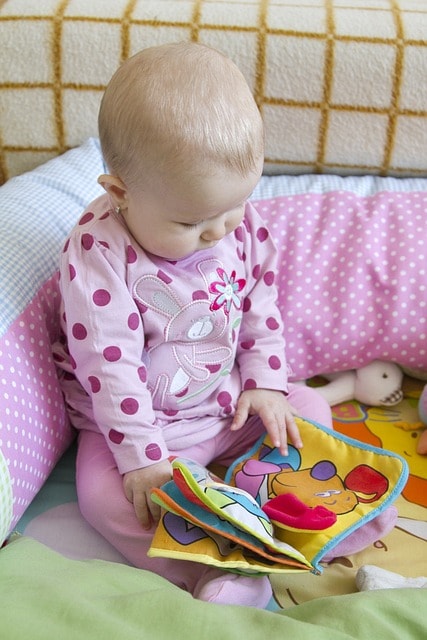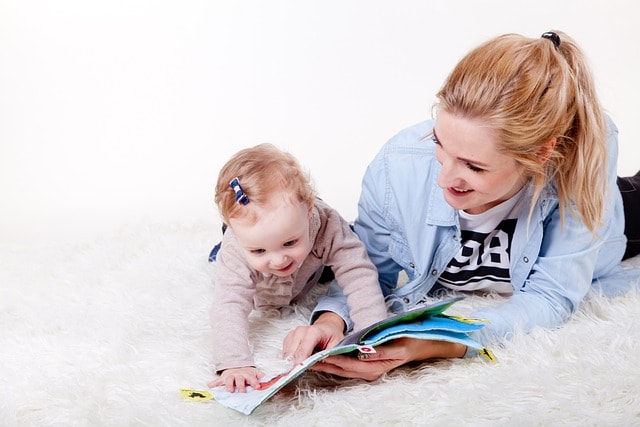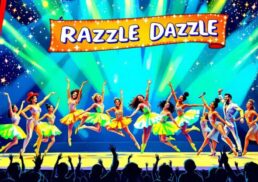When do infants begin to talk? Infants usually begin to talk around their first birthday. The journey starts much earlier with cooing and babbling, which are essential for speech development. This article will guide you through the key language milestones from birth to twelve months and offer tips on encouraging your baby to talk.
Table of Contents
Key Takeaways
Babies typically start talking around their first birthday, but language development begins with cooing and babbling from as early as 3 months old.
By 6 to 12 months, babies increasingly recognize their names, respond to simple commands, and may say their first words like ‘mama’ or ‘dada.’
Parents can encourage language development through frequent talking, reading aloud, using gestures, and responding to their baby’s attempts to communicate.
When Do Infants Begin to Talk?

As parents, we look forward to the day our baby begins to speak, signifying a major advancement in their language skills. But the symphony of baby talk begins long before actual words are formed. From birth, your little one starts to attune to the world of language. This journey through sounds, as fascinating as it is vital, plays a significant role in their speech development. Let’s delve into the timeline of how infants progress from expressing basic needs to sharing their thoughts with words.
Life’s first year is filled with speech milestones, commencing with simple coos and culminating in the thrilling moment when babies utter their first words. This period is characterized by intense learning and growth, with each “goo” and “gaa” serving as a stepping stone in your child’s speech development. They’re not just making noise; they’re mastering the art of communication, one babble at a time. So, when does this journey commence? Infants usually start their vocal exploration around their first birthday, although the foundation for language is laid much earlier.
By 3 months
Imagine the delight of hearing your baby’s first coos and seeing their first smiles as they reach the three-month mark. These sounds are not merely expressions of contentment; they’re the early whispers of communication. Your little one starts to explore their voice, experimenting with different sounds to express emotions and needs.
Recognizing a world filled with familiar voices, they begin to show responses, laying the foundation for the complex language skills that will blossom over the coming months.
By 6 months
As the half-year milestone approaches, your baby’s coos evolve into playful babbling, filled with delightful consonant-vowel combinations like ‘ba-ba’ and ‘da-da’. These sounds are the building blocks of speech, and while they may not carry meaning yet, they’re significant progress in your baby’s language development.
Around this time, your little chatterbox starts recognizing their own name and begins to start talking, indicating that they’re attuning to the specific language sounds in their environment, setting the stage for more intentional communication.
By 9 months
By 9 months, your baby’s world of sound is expanding rapidly. They’re not just listening; they’re actively engaging. The babbling becomes more sophisticated, and they may start to understand and respond to simple commands like ‘No’. Gestures such as pointing or waving ‘bye-bye’ join the mix, adding a new dimension to how your baby communicates their needs and interests.
This fusion of sound and action signals that your baby is nearing the threshold of more complex forms of expression.
By 12 months
The grand finale of your baby’s first year is often marked by those magical baby’s first words. ‘Mama,’ ‘dada,’ or even ‘uh-oh’ can emerge as clear favorites, much to the joy and amazement of everyone around. At this age, babies begin imitating the sounds and gestures they see, using their growing repertoire to communicate more effectively. Some common first words include:
Mama
Dada
Uh-oh
Bye-bye
Hi
Dog
Cat
Ball
No
Yes
It’s important to remember that every baby develops at their own pace, so don’t worry if your baby’s first words come a little later than expected.
Simple commands become part of their understanding, and they may even start to wave ‘bye-bye’ with intention. For any parent, it’s a moment of pride and warmth to witness the blossoming of language seeds into simple words of actual speech, even if it’s just a few simple words.
When Do Babies Say Their First Word?

Have you ever wondered when you’ll first hear that tiny voice call out a recognizable word? Babies often say their first word around their first birthday, but like all aspects of development, there’s a spectrum of normalcy. Some little ones may surprise you with their early attempts at words as young as 7 months, while others take their sweet time, reaching this milestone closer to 18 months. It’s a range that varies as widely as babies themselves, each child finding their voice in their own time.
Such variability is entirely normal, influenced by various factors, including the baby’s environment and their unique developmental pace. While most babies will have uttered that first word by their first birthday, some may need a little more time to get comfortable with producing speech sounds. Patience is key, as is providing a nurturing, language-rich environment that encourages your baby to experiment with those first tentative words. Remember, every “ba,” “ma,” or giggle is a significant step towards your baby’s first sentence.
How Babies Develop Language Skills
Embarking on the path to language is an intricate process for babies, influenced by a tapestry of factors. It’s not simply about reaching a certain age; rather, it’s a symphony of elements such as the home environment, social interactions, and cognitive skills that harmonize to unlock the rich world of language. Cultural and social nuances, alongside the frequency of verbal interactions, all play pivotal roles in shaping a child’s language experiences. From the moment of birth, babies are immersed in a sensory-rich world that lays the groundwork for their language skills.
Cognitive skills like memory and attention silently orchestrate this process, steering infants as they learn to differentiate and eventually mimic the sounds they hear. An engaging and responsive environment can significantly boost language development, encouraging babies to explore and play with sounds. As they grow, their brains, remarkable in plasticity, rapidly absorb the nuances of their native language. It’s an ongoing journey, one that begins with the simplest of coos and evolves into the ability to share thoughts, feelings, and ideas through speech.
Birth to 3 months
From the very start, your newborn is already on the fast track to talking. The reflexive sounds they make in the first two months are preludes to the coos and smiles that emerge as their first intentional forms of communication. These early vocalizations are baby’s way of tuning into the melody of language, alert to sounds and responsive to your voice.
During this period, different sounds convey varied emotions, and your baby starts comprehending the structure of words and sentences. Each interaction, each moment of eye contact or shared smile, is a lesson in the art of conversation for your little one.
4 to 6 months
As your baby approaches the half-year mark, their babbling becomes more frequent and diverse. It’s during this time that they begin the canonical babbling stage, a delightful period filled with attempts to imitate sounds and the formation of varied vowel and consonant combinations. These vocal experiments are not just adorable; they’re crucial for the development of clear speech later on.
Your baby is now reacting not only to you but also to toys and other sound-making objects, an indication that they’re ready to start understanding and eventually forming words. This is the stage when babies start talking, making it an exciting time for parents.
7 to 12 months
As your baby’s first birthday draws near, their babbling takes on new depth. Words start to mean something; ‘mama’ and ‘dada’ are no longer just sounds but precious labels for the most familiar people in their lives. This period is marked by a narrowing of the sounds used in babbling, refining them to fit the language spoken at home.
Long strings of babble such as ‘mamamama’ and ‘babababa’ become commonplace, hinting at the formation of actual words. It’s a stage where many parents eagerly await those first purposeful utterances, knowing that their baby is beginning to truly communicate.
Tips to Encourage Your Baby to Talk

As your little one sets out on this language discovery journey, your role as a parent becomes crucial. There are a myriad of ways to nurture and encourage your baby’s speech development, creating a supportive atmosphere that can help them find their voice. From the simplicity of face-to-face interactions to the joy of shared reading time, each activity you engage in with your baby can have a profound impact on their language skills. Let’s explore some tried-and-true strategies to encourage those precious first words.
One of the most powerful tools at your disposal is your own voice. Engaging your baby in conversation, even if it’s a one-sided chat about the weather or your grocery list, provides them with a model for language. Singing nursery rhymes, reading books with colorful pictures, and responding to their babbles with enthusiasm all contribute to their understanding of speech sounds. By being attuned to their attempts to communicate and offering praise for their efforts, you’re reinforcing their desire to speak. Remember, every interaction is an opportunity to teach and inspire your baby to talk, and even to sing songs.
Talk Frequently
The more you talk to your baby, the more words they’re exposed to, and the richer their language experience becomes. Here are some tips to help you engage with your baby:
Narrate your day-to-day activities, pointing out and naming objects around the house
Engage in playful back-and-forth “conversations”
Use a constant stream of language to help your baby learn new words and understand the natural rhythm and flow of conversation
These strategies will not only help your baby develop their language skills but also strengthen your bond with them.
By treating their coos and babbles as complete sentences, you motivate your baby to keep experimenting with sounds and ultimately form their own words.
Read Aloud

There’s magic in the pages of a children’s book, and reading aloud to your baby taps into that wonder. Here are some tips for reading to your baby:
Select books with vibrant illustrations and simple, rhythmic text to captivate your little one’s attention.
Use different voices for various characters to bring the stories to life.
Don’t hesitate to read their favorite book over and over.
Repetition helps reinforce language patterns and familiarizes your baby with common words and phrases. As you read, discuss the images and story, inviting your baby to look at the pictures and touch the pages, turning reading time into an interactive language lesson.
Use Gestures
Words are only one piece of the communication puzzle; gestures and facial expressions add depth and clarity. When you speak to your baby, accompany your words with hand motions and visual cues. Pointing to objects as you name them helps solidify their understanding of the connection between words and actions. Encourage your baby to imitate your gestures, such as waving goodbye, to reinforce their language learning.
Toddlers often use a combination of words and gestures to express themselves before they can form full sentences, so nurturing this ability early on can aid their overall speech development. By encouraging them to use a few words, parents can help their children develop better communication skills.
Recognizing Speech Delays
While each child develops at their unique pace, it’s crucial to stay alert for signs of potential speech delay. Recognizing these early can make a significant difference, as early intervention often leads to better outcomes. Speech delays can manifest in various ways, such as limited vocabulary for their age or difficulty following simple directions. Parents and caregivers should stay observant and note whether their child is reaching speech milestones within the expected time frames. If you find yourself growing concerned, it can be invaluable to consult with a pediatrician or a speech-language pathologist who can provide guidance or intervention if necessary.
It’s not uncommon for children with speech delays to have trouble with the coordination of the lips, tongue, and jaw needed to produce clear speech sounds. Factors such as hearing loss, other developmental delays, or autism spectrum disorder can contribute to speech delays. If by age 2 your child isn’t speaking about 50 words or is hard to understand, it’s a good idea to seek advice from a professional. Remember, the earlier a speech delay is identified and addressed, the better the chances are for improvement. Regular hearing tests are also crucial, as hearing problems can significantly affect speech development.
Common Signs
What should you look for when trying to recognize a speech delay? Common signs include:
A preference for gestures over vocalizations, particularly after 18 months
Difficulty following simple directions
Pointing or using other non-verbal methods to communicate
If your child exhibits these signs, it may be a signal that they’re struggling with speech. However, it’s important to keep in mind that while these signs can indicate a delay, they don’t necessarily confirm one. Every child is unique, and some may simply be late bloomers in the language department.
However, being aware of these common signs can help you stay proactive about your child’s speech and language development.
When to Seek Help
If you’re concerned about your child’s speech development, don’t hesitate to consult a speech-language pathologist (SLP). These professionals can perform standardized tests and observe milestones to determine if there’s a delay or disorder at play. They can also provide resources and strategies to support your child’s communication skills.
The speech therapy programs are designed to help children overcome language impairments and find their voice. If your instincts tell you that something’s not quite right with your child’s speech, trust that feeling and seek advice. It’s always better to err on the side of caution when it comes to your child’s development.
Learn more, visit Language and Speech Delays in Toddlers.
What Comes After the First Words?
Following your child’s first words, you might be curious about the ensuing stages in their language development. After the initial excitement of “mama” or “dada,” toddlers continue to expand their vocabulary at a remarkable pace. They start to string words together to form simple sentences and become more adept at expressing their needs and desires. This progression is an incredible phase of development, showcasing the rapid growth that occurs during the early years. As their vocabulary grows, so does their ability to communicate more complex thoughts and ideas, and before you know it, you’ll be engaging in full-fledged conversations with your little one.
In this phase, your toddler becomes more interactive, employing language to explore their surroundings and establish connections with others around them. They’ll begin to understand more about the world and how to navigate it through language. It’s a time of discovery, filled with new words and phrases that will become the foundation for more advanced speech. By the age of 2, you can expect your toddler to be putting together two-word phrases and maybe even a few three-word sentences. It’s a fascinating progression to witness, and as a parent, you play a key role in supporting and encouraging this development.
18 to 24 Months
The journey from single words to connecting thoughts begins between 18 to 24 months. Toddlers start to experiment with combining words, such as “more milk” or “big dog,” to express complex ideas. During this time, they also learn new words at an impressive rate, often picking up about one new word every week. This rapid vocabulary expansion allows them to follow simple commands and express their thoughts more clearly.
As a parent, you can foster this growth by responding with full sentences and introducing words that go together. This not only aids in their understanding but also encourages them to start forming their own phrases and two word sentences.
2 to 3 Years
From ages 2 to 3, your child’s ability to communicate takes on new sophistication. They begin forming simple sentences, following two-step instructions, and their speech becomes clearer to understand. This is a crucial time for child’s speech development, as well as language development, as children start to grasp the rules of grammar and increase their sentence complexity. They also develop the ability to answer questions and engage in short conversations.
Your role in this developmental stage is to:
Continue providing a supportive environment, filled with rich language experiences
Practice patient listening
Encourage your child to express themselves
Praise their efforts
These actions will go a long way in nurturing their growing communication skills.
Summary
We’ve journeyed through the wondrous landscape of your baby’s speech development, from their first coos and babbles to the formation of sentences that express their unique perspectives. It’s clear that language development is a complex, multifaceted process influenced by a child’s environment, their interactions, and their innate cognitive abilities. By engaging with your baby, providing a language-rich environment, and recognizing the signs of potential speech delays, you can support your child’s journey to becoming a confident communicator.
As you cherish each new sound and word, remember that your encouragement and involvement are invaluable to your child’s progress. Celebrate each milestone, remain patient through the quieter phases, and enjoy the ongoing dialogue that will continue to evolve. May you and your little one share many joyful conversations and forge an unbreakable bond through the power of language. Here’s to the chatter, the laughter, and the profound moments of connection that await you both!
Frequently Asked Questions
What is the typical age for a baby to say their first word?
Babies typically say their first word around their first birthday, but it can vary from 7 to 18 months due to unique development and various influencing factors.
How can I encourage my baby to start talking?
You can encourage your baby to start talking by creating a language-rich environment, talking about everyday activities, and responding to their communication attempts. Remember to praise their efforts, no matter how small.
What are common signs of a speech delay?
If you notice your child preferring gestures over vocalizations after 18 months, having limited vocabulary for their age, or difficulty following simple directions, it’s important to consult with a pediatrician or speech-language pathologist.
How many words should my child know by age 2?
By age 2, your child should know about 50 to 100 words and use several two-word phrases. However, the important thing is consistent growth in their vocabulary.
When should I seek help for my child’s speech development?
If you’re worried about your child’s speech development, especially if they’re not speaking about 50 words by age 2 or you suspect a speech delay, it’s important to seek an evaluation from a pediatric speech-language pathologist for early intervention.









